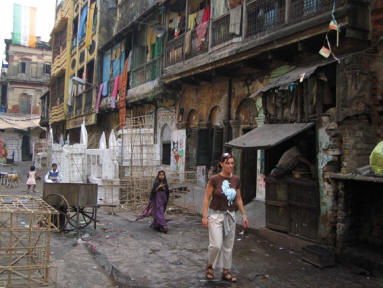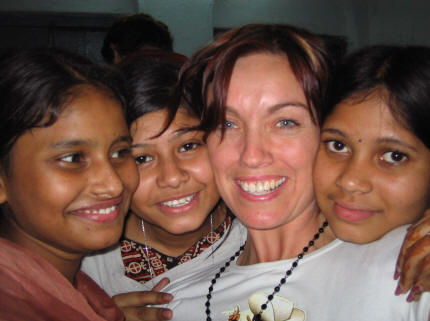PROSTITUTES WELCOME AT THE 'CALCUTTA HILTON'
TV documentary reveals how a
Kiwi couple set up a business to rescue girls and women from sex slavery
By Lavinia Ngatoko of
Challenge Weekly, New Zealand
Monday, November 7, 2005
CALCUTTA, INDIA (ANS) -- The
largest red-light district in Calcutta, India is not exactly the kind
of place you would expect to find a Kiwi couple and their four children
in residence.
 |
|
The Calcutta neighborhood in which the Hiltons operate.
|
But for Kerry
and Annie Hilton, who with their children aged eight to 16 left the
comforts of Albany, Auckland, for India in 1999, the infamous sex
district of Sonnagachi is home.
When the Kiwi couple decided to move to India to help the poor, they
never dreamed they would one day end up working with prostitutes. They
only discovered quite by accident that the crowded district they had
moved into was a place where, every day, 20,000 men seek out the
services of the 6000 women who work there.
The couple decided to do some research into the possibility of setting
up a business in the area which would provide an alternative source of
employment for sex workers.
The result was the establishment in 2001 of Freeset, a viable business
that involves the manufacture of jute bags for export.
After meeting Mr. Hilton a few years ago, a former TV3 news editor,
John Sinclair, became enthralled with the family’s work in Calcutta and
developed a passion to tell their story.
About two years ago he took a few months’ leave from work, to spend
some time in Calcutta shooting footage for a documentary called -
Calcutta Hilton.
The finished work, a half-hour documentary presented and co-written by
television personality Evie Ashton, will screen on TV2 in New Zealand
on Wednesday, November 16, at 11.20pm.
I have seen it – and Calcutta Hilton is a must-see documentary, which
will make anyone who watches it think twice before moaning about how
miserable his or her life is.
The obvious joy of the former prostitutes at finally finding freedom
from sexual bondage will have you smiling.
Then you will find yourself shedding a tear, as the tale unfolds of
others, such as Mena, taken from her home in Bangladesh when she was
just 13 to be forced to work as a prostitute.
 |
|
Evie Ashton,
presenter and co-writer of the documentary,
with some of the rescued girls
|
You will be
aghast at the night-time scenes of hundreds of men milling about taking
their pick from the lines of women, many of them no more than girls.
Then there are the scenes of children playing out on the streets well
into the evening.
Mr. Sinclair told Challenge Weekly there are now about 50 women working
at Freeset, which lately obtained larger premises.
“One of the biggest problems they faced was space,” Mr. Sinclair said.
“The area is residential area and not geared towards industry. They
were working in a poky little room in a residential building. There
were an unbelievable number of sewing machines all squashed in there.”
At Freeset not only are the women trained to become skilled workers and
businesswomen: they are also taught to read and write.
Many of the women in Sonnagachi were stolen from their homes; some were
tricked and others sold into prostitution by their friends and
families. In the class system of India they compete with the people who
handle dead bodies not to be at the bottom of the heap. Most of them
are illiterate.
But Mr. Sinclair emphasizes that although the Hiltons are Christians,
and Freeset is aimed at releasing prostitutes from sexual slavery, the
business is not a charity.
Although ideally the Hiltons would love to take on more employees, they
have to be wary of “tripping themselves up. Kerry’s a softie. He will
do his best to take on a worker but really you just can’t take on
everyone.”
That is the harsh reality of what the Hiltons have to face every day –
having to say no because they just cannot afford to take anyone else
on. Or losing a worker, who, inevitably, returns to life as a
prostitute for a variety of reasons, including alcohol abuse or just
because they cannot get out of it.
“For me one of the most heart-breaking experiences was seeing one of
the women who previously worked for Freeset standing on the side of the
road waiting for clients,” said Mr. Sinclair. “She just couldn’t deal
with the regular hours there.”
He says leaving Calcutta after finishing filming was especially hard.
“I didn’t even want to leave the women who were amazing – seeing the
smiles on their faces when they come to work was so inspiring. The
Hiltons were inspiring.”
The impression imprinted on his heart from his time at Freeset was so
indelible that he gave up work to go back this year for six months to
help out in any way he could.
“I made some promotional videos for them, did some graphic and
publicity work and helped with the ongoing renovation scheme in their
new building.”
Mr. Sinclair said that the documentary had lots of elements of drama
and poverty but most of all it offered some hope.
“It is a positive story of hope. It’s one day at a time, one person at
a time. For every person helped that is a whole life changed. You can’t
change the whole world at once but you can make a difference.”
It was also important to look at the long-term goal of not only helping
the women, but the men who had been brought up believing that it was
okay to abuse these women.
“We have to help the men; they grow up thinking this behavior is
normal.”
But, for the moment the Hiltons will continue to battle against the
class system, the women’s own feelings of shame and the ruthlessness of
those who “own” them or are against their striving to offer freedom to
thousands.
As Mr. Hilton said: “It’s not about giving them jobs; it’s all about
giving them freedom.”
Lavinia Ngatoko is a
reporter for Challenge Weekly, New Zealand’s non-denominational,
independent national Christian newspaper, the first in the world to
carry that masthead. |
 |



